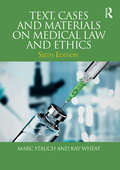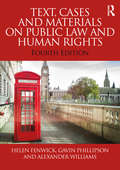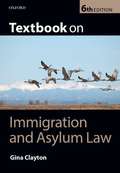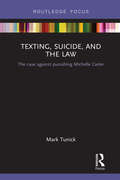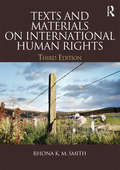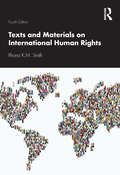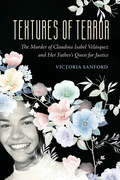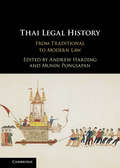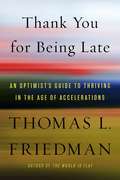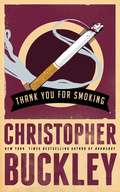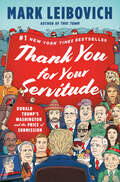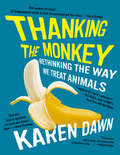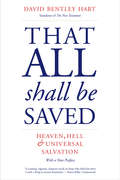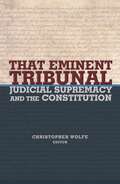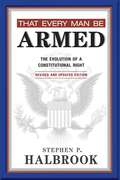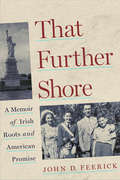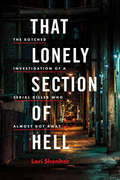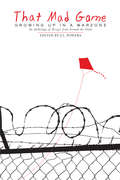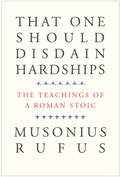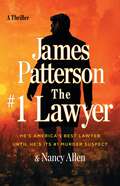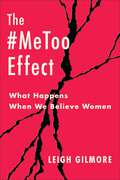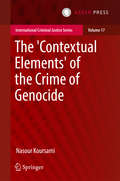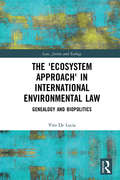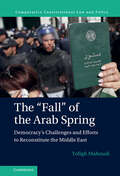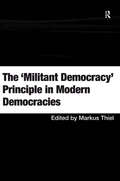- Table View
- List View
Text, Cases and Materials on Medical Law and Ethics
by Marc Stauch Kay WheatText, Cases and Materials on Medical Law and Ethics presents a valuable collection of materials relating to often controversial areas of the law. Comprising extracts from statutes, cases and scholarly articles alongside expert author commentary and guidance which signposts the key issues and principles, this book is an ideal companion to this increasingly popular subject. Fully revised, this new edition incorporates expanded content, including: updated coverage of consent and decision making, including the the Montgomery v Lanarkshire Health Board (2015) judgment; the impacts of the EC directive for clinical trials and GDPR on the research use of patient data; and discussion of other recent developments in the case law, including the 2017 Charlie Gard litigation, the 2016 Privy Council decision in Williams v Bermuda on negligence causation, and the UK Supreme Court judgment in A & B v SS for Health (2017) on funding for patients from Northern Ireland seeking terminations elsewhere. Providing a comprehensive and up-to-date resource on this topical area of the law, this textbook is an invaluable reference tool for students of medical law as well as those studying medicine.
Text, Cases and Materials on Public Law and Human Rights
by Alexander Williams Helen Fenwick Gavin PhillipsonThis book interweaves an authoritative authorial commentary – significantly expanded from the last edition - with extracts from a diverse and contemporary collection of cases and materials from three leading academics in the field. It provides an all-encompassing student guide to constitutional, administrative and UK human rights law. This fourth edition provides comprehensive coverage of all recent developments, including the Fixed Term Parliaments Act 2011, restrictions on judicial review (Criminal Justice and Courts Act 2015), changes to judicial appointments (Crime and Courts Act 2013), the 2014 Scottish Independence Referendum, Scotland Act 2016 and draft Wales Bill 2016. Recent devolution cases in the Supreme Court, including Imperial Tobacco (2012) and Asbestos Diseases (2015) are fully analysed, as is the 2015 introduction of English Votes for English Laws. The remarkable Evans (2015) ‘Black Spider memos’ case is considered in a number of chapters. The common law rights resurgence seen in Osborn (2013), BBC (2014) and Kennedy (2014) is analysed in several places, along with other key developments in judicial review such as Keyu (2015) and Pham (2015). Ongoing parliamentary reform in both Lords and Commons, including major advances in controlling prerogative powers, are fully explained, as is the adaptation of the core Executive to Coalition Government (2010-2015). There is comprehensive coverage of key Strasbourg and HRA cases (Horncastle (2010), Nicklinson (2014), Moohan (2014), Carlile (2014)), and those in core areas of freedom of expression, police powers and public order (Animal Defenders (2013), Beghal (2015), Roberts (2015), Miranda (2016)) and the prisoners’ voting rights saga, up to Chester (2015).
Textbook on Immigration and Asylum Law
by Gina ClaytonThe sixth edition of Textbook on Immigration and Asylum Law continues to provide students with expert coverage of case law and legislation, along with dynamic analysis of the political context and social impact of the law, and a strong focus on human rights. An essential text for students at all levels, the book deftly guides the reader through this fascinating and constantly developing area of law.
Texting, Suicide, and the Law: The case against punishing Michelle Carter
by Mark TunickIn 2014, Conrad Roy committed suicide following encouragement from his long-distance girlfriend, Michelle Carter, in what has become known as the Texting Suicide case. The case has attracted much attention, largely focusing on the First Amendment free speech issue. This book takes the view that the issue is intertwined with several others, some of which have received less attention but help explain why the case is so captivating and important, issues concerning privacy, accountability, coercion, punishment, and assisted suicide. The focus here is on how all of these issues are interconnected. By breaking the issue down into its complex layers, the work aids reasoned judgment, ensuring we aren’t guided solely by our gut reactions. The book is laid out as a case against punishing Ms. Carter, but it is less important that we agree with that conclusion than that we reach our conclusions not just through our instincts and intuitions but by thinking about these fundamental issues. The work will be of interest to scholars in law, political theory, and philosophy as an example of how theoretical issues apply to particular controversies. It will also appeal to readers interested in freedom of speech and the First Amendment, criminal justice and theories of punishment, suicide laws, and privacy.
Texts and Materials on International Human Rights
by Rhona K.M. SmithText and Materials on International Human Rights offers a carefully tailored overview of the subject, divided into four sections that cover: sources and theories; institutions and structures; substantive rights; and a new concluding section on the challenges for human rights law. The third edition is fully updated to include all key developments, in particular issues around torture, terrorism and international criminal law. This collection of materials offers a comprehensive overview of the institutional structures relevant to international human rights law, crucial to the understanding of how law works in this challenging area. Designed to guide students through the fundamental texts for this subject, the author’s commentary contextualises each extract to explain its relevance, while highlighted further reading makes links to cutting edge academic commentary to provide next steps for student research. Offering a clear text design that distinguishes between materials and author commentary, and including reflective questions throughout to aid understanding, this book is ideal for students seeking to engage with the key issues in the study of International Human Rights.
Texts and Materials on International Human Rights
by Rhona K.M. SmithTexts and Materials on International Human Rights offers a carefully tailored overview of the subject that covers sources and theories, institutions and structures, and substantive rights. The fourth edition is fully updated to include all key developments in the law, in particular issues around reform in the UN and the topical application of human rights around the world. This collection of materials offers a comprehensive overview of the institutional structures relevant to international human rights law, crucial to the understanding of how law works in this challenging area. Designed to guide students through the fundamental texts for this subject, the author’s commentary contextualises each extract to explain its relevance, while highlighted further reading makes links to cutting edge academic commentary to provide next steps for student research. Offering a clear text design that distinguishes between materials and author commentary, and including reflective questions throughout to aid understanding, this book is ideal for students seeking to engage with the key issues in the study of International Human Rights.
Textures of Terror: The Murder of Claudina Isabel Velasquez and Her Father's Quest for Justice (California Series in Public Anthropology #55)
by Victoria SanfordInvestigating the unsolved murder of a female law student and the pervasive violence against Guatemalan women that drives migration. Part memoir and part forensic investigation, Textures of Terror is a gripping first-person story of women, violence, and migration out of Guatemala—and how the United States is implicated. Accompanying Jorge Velásquez in a years-long search for answers after the brutal murder of his daughter Claudina Isabel, Victoria Sanford explores what it means to seek justice in "postconflict" countries where violence never ended. Through this father's determined struggle and other stories of justice denied, Textures of Terror offers a deeper understanding of US policies in Latin America and their ripple effect on migration. Sanford offers an up-close appraisal of the inner workings of the Guatemalan criminal justice system and how it maintains inequality, patriarchy, and impunity. Presenting the stories of other women who have suffered at the hands of strangers, intimate partners, and the security forces, this work reveals the deeply gendered nature of power and violence in Guatemala.
Thai Legal History: From Traditional to Modern Law
by Andrew Harding Munin PongsapanThis is the first book to provide a broad coverage of Thai legal history in the English language. It deals with pre-modern law, the civil law reforms of the late 19th and early 20th centuries, and the constitutional developments post-1932. It reveals outstanding scholarship by both Thai and international scholars, and will be of interest to anyone interested in Thailand and its history, providing an indispensable introduction to Thai law and the legal system. The civil law reforms are a notable focus of the book, which provides material of interest to comparative lawyers, especially those interested in the diffusion of the civil law.
Thank You For Being Late: An Optimist's Guide To Thriving In The Age Of Accelerations
by Thomas L. FriedmanA field guide to the twenty-first century, written by one of its most celebrated observers<P><P> We all sense it―something big is going on. You feel it in your workplace. You feel it when you talk to your kids. You can’t miss it when you read the newspapers or watch the news. Our lives are being transformed in so many realms all at once―and it is dizzying.<P> In Thank You for Being Late, a work unlike anything he has attempted before, Thomas L. Friedman exposes the tectonic movements that are reshaping the world today and explains how to get the most out of them and cushion their worst impacts. You will never look at the world the same way again after you read this book: how you understand the news, the work you do, the education your kids need, the investments your employer has to make, and the moral and geopolitical choices our country has to navigate will all be refashioned by Friedman’s original analysis.<P> Friedman begins by taking us into his own way of looking at the world―how he writes a column. After a quick tutorial, he proceeds to write what could only be called a giant column about the twenty-first century. His thesis: to understand the twenty-first century, you need to understand that the planet’s three largest forces―Moore’s law (technology), the Market (globalization), and Mother Nature (climate change and biodiversity loss)―are accelerating all at once. These accelerations are transforming five key realms: the workplace, politics, geopolitics, ethics, and community.<P> Why is this happening? As Friedman shows, the exponential increase in computing power defined by Moore’s law has a lot to do with it. The year 2007 was a major inflection point: the release of the iPhone, together with advances in silicon chips, software, storage, sensors, and networking, created a new technology platform. Friedman calls this platform “the supernova”―for it is an extraordinary release of energy that is reshaping everything from how we hail a taxi to the fate of nations to our most intimate relationships. It is creating vast new opportunities for individuals and small groups to save the world―or to destroy it.<P> Thank You for Being Late is a work of contemporary history that serves as a field manual for how to write and think about this era of accelerations. It’s also an argument for “being late”―for pausing to appreciate this amazing historical epoch we’re passing through and to reflect on its possibilities and dangers. To amplify this point, Friedman revisits his Minnesota hometown in his moving concluding chapters; there, he explores how communities can create a “topsoil of trust” to anchor their increasingly diverse and digital populations.<P> With his trademark vitality, wit, and optimism, Friedman shows that we can overcome the multiple stresses of an age of accelerations―if we slow down, if we dare to be late and use the time to reimagine work, politics, and community. Thank You for Being Late is Friedman’s most ambitious book―and an essential guide to the present and the future. <P><b>A New York Times Bestseller</b>
Thank You for Smoking
by Christopher BuckleyNobody blows smoke like Nick Naylor. He's a spokesman for the Academy of Tobacco Studies-in other words, a flack for cigarette companies, paid to promote their product on talk and news shows. The problem? He's so good at his job, so effortlessly unethical, that he's become a target for both anti-tobacco terrorists and for the FBI. In a country where half the people want to outlaw pleasure and the other want to sell you a disease, what will become of the original Puff Daddy?
Thank You for Your Servitude: Donald Trump's Washington and the Price of Submission
by Mark LeibovichFrom the author of the #1 New York Times bestseller This Town, the eyewitness account of how the GOP collaborated with Donald Trump to transform Washington’s “swamp” into a gold-plated hot tub—and a onetime party of rugged individualists into a sycophantic personality cult. <p><p>In the early months of Trump’s candidacy, the Republican Party’s most important figures, people such as Marco Rubio, Ted Cruz, and Lindsey Graham, were united—and loud—in their scorn and contempt. Even more, in their outrage: Trump was a menace and an affront to our democracy. Then, awkwardly, Trump won. <p><p>Thank You for Your Servitude is Mark Leibovich’s unflinching account of the moral rout of a major American political party, tracking the transformation of Rubio, Cruz, Graham, and their ilk into the administration’s chief enablers, and the swamp’s lesser lights into frantic chasers of the grift. What would these politicos do to preserve their place in the sun, or at least the orbit of the spray tan? What would they do to preserve their “relevance”? Almost anything, it turns out. <p><p>Trump’s savage bullying of everyone in his circle, along with his singular command of his political base, created a dangerous culture of submission in the Republican Party. Meanwhile, many of the most alpha of the lapdogs happily conceded to Mark Leibovich that they were “in on the joke.” <p><p>As Lindsey Graham told the author, his supporters in South Carolina generally don’t read The New York Times, and they won’t read this book, either. All that cynicism, shading into nihilism, led to a country truly unhinged from reality, and to the events of January 6, 2021. It’s a vista that makes the Washington of This Town seem like a comedy of manners in comparison. <p><p>Thank You for Your Servitude isn’t another view from the Oval Office: it’s the view from the Trump Hotel. We can check out any time we want, but only time will tell if we can ever leave. <p> <b>New York Times Bestseller</b>
Thanking the Monkey: Rethinking the Way We Treat Animals
by Karen DawnThe animal rights movement has reached a tipping point. No longer a fringe extremist cause, it has become a social concern that leading members of society endorse and young people embrace. From Michael Vick's dog fighting scandal to CNN’s airing of the eye-opening film Blackfish, animal rights issues have hit the headlines—and are being championed by students and senators, pop stars and producers, and actors and activists.Don't you want to be part of the conversation? In Thanking the Monkey, Karen Dawn covers pets, fur, fashion, food, animal testing, activism, and more. But as the title playfully suggests, this isn't like any previous animal rights book. Thanking the Monkey is light on lectures meant to make you feel guilty if you're not yet a leather-eschewing vegan. It lets you have fun as you learn why so many of your favorite actors and musicians won't eat or wear animals. And you'll laugh over scores of cartoons by Dan Piraro'sBizzaro and other animal-friendly comics.This fun primer for a smart and socially committed generation delivers some serious surprises in the form of facts and figures about the treatment of animals. Yes, it will shock you with tales of primates still used in animal testing on nicotine or killed for oven cleaner. But it will also let you lighten up and laugh a little as we work out how to do a better job of thanking the monkey.
That All Shall Be Saved: Heaven, Hell, and Universal Salvation
by David Bentley HartA stunning reexamination of one of the essential tenets of Christian belief from one of the most provocative and admired writers on religion today The great fourth‑century church father Basil of Caesarea once observed that, in his time, most Christians believed that hell was not everlasting, and that all would eventually attain salvation. But today, this view is no longer prevalent within Christian communities. In this momentous book, David Bentley Hart makes the case that nearly two millennia of dogmatic tradition have misled readers on the crucial matter of universal salvation. On the basis of the earliest Christian writings, theological tradition, scripture, and logic, Hart argues that if God is the good creator of all, he is the savior of all, without fail. And if he is not the savior of all, the Kingdom is only a dream, and creation something considerably worse than a nightmare. But it is not so. There is no such thing as eternal damnation; all will be saved. With great rhetorical power, wit, and emotional range, Hart offers a new perspective on one of Christianity’s most important themes.
That Eminent Tribunal: Judicial Supremacy and the Constitution (New Forum Books #35)
by Christopher WolfeThe role of the United States Supreme Court has been deeply controversial throughout American history. Should the Court undertake the task of guarding a wide variety of controversial and often unenumerated rights? Or should it confine itself to enforcing specific constitutional provisions, leaving other issues (even those of rights) to the democratic process? That Eminent Tribunal brings together a distinguished group of legal scholars and political scientists who argue that the Court's power has exceeded its appropriate bounds, and that sound republican principles require greater limits on that power. They reach this conclusion by an interesting variety of paths, and despite varied political convictions. Some of the essays debate the explicit claims to constitutional authority laid out by the Supreme Court itself in Planned Parenthood v. Casey and similar cases, and others focus on the defenses of judicial authority found commonly in legal scholarship (e.g., the allegedly superior moral reasoning of judges, or judges' supposed track record of superior political decision making). The authors find these arguments wanting and contend that the principles of republicanism and the contemporary form of judicial review exercised by the Supreme Court are fundamentally incompatible. The contributors include Hadley Arkes, Gerard V. Bradley, George Liebmann, Michael McConnell, Robert F. Nagel, Jack Wade Nowlin, Steven D. Smith, Jeremy Waldron, Keith E. Whittington, Christopher Wolfe, and Michael P. Zuckert.
That Every Man Be Armed: The Evolution of a Constitutional Right. Revised and Updated Edition.
by Stephen P. HalbrookThat Every Man Be Armed, the first scholarly book on the Second Amendment to the U.S. Constitution, has played a significant role in constitutional debate and litigation since it was first published in 1984. Halbrook traces the right to bear arms from ancient Greece and Rome to the English republicans, then to the American Revolution and Constitution, through the Reconstruction period extending the right to African Americans, and onward to today&’s controversies. With reviews of recent literature and court decisions, this new edition ensures that Halbrook&’s study remains the most comprehensive general work on the right to keep and bear arms.
That Further Shore: A Memoir of Irish Roots and American Promise
by John D. FeerickA rare and evocative memoir of a respected constitutional scholar, dedicated public servant, political reformer, and facilitator of peace in the land of his ancestors.John D. Feerick’s life has all the elements of a modern Horatio Alger story: the poor boy who achieves success by dint of his hard work. But Feerick brought other elements to that classic American success story: his deep religious faith, his integrity, and his paramount concern for social justice. In his memoir, The Further Shore, Feerick shares his inspiring story, from his humble beginnings: born to immigrant parents in the South Bronx, going on to practice law, participating in framing the U.S. Constitution’s Twenty-Fifth Amendment, serving as dean of Fordham Law, and serving as President of the New York City Bar Association and chair of state commissions on government integrity.Beginning with Feerick’s ancestry and early life experiences, including a detailed genealogical description of Feerick’s Irish ancestors in County Mayo and his laborious quest to identify them and their relationships with one another, the book then presents an evocative survey of the now-vanished world of a working-class Irish Catholic neighborhood in the South Bronx. Feerick’s account of how he financed his education from elementary school through law school is a moving tribute to the immigrant work ethic that he inherited from his parents and shared with many young Americans of his generation. The book then traces Feerick’s career as a lawyer and how he gave up a lucrative partnership in a prestigious New York City law firm at an early age to accept the office of Dean of the Fordham School of Law at a fraction of his previous income because he felt it was time to give back something to the world.John Feerick has consistently shown his commitment to the law as a vocation as well as a profession by his efforts to protect the rights of the poor, to enable minorities to achieve their rightful places in American society, and to combat political corruption. That Further Shore is an inspiring memoir of how one humble and decent man helped to make America a more just and equitable society.
That Lonely Section of Hell
by Lori ShenherFrom her first assignment in 1998 to explore an increase in the number of missing women to the harrowing 2002 interrogation of convicted serial killer Robert Pickton, Lori Shenher tells a story of massive police failure-failure of the police to use the information about Pickton available to them, failure to understand the dark world of drug addiction and sex work, and failure to save more women from their killer.Shenher explains how police unwillingness to believe the women were missing or murdered, jurisdictional squabbles, and a fear of tunnel vision conspired to leave women unprotected and vulnerable to a serial killer nearly three years after she first received a tip that Pickton could be responsible. She unflinchingly reveals her own pain and psychological distress as a result of these events, which left her unable to work with or trust the police and the criminal justice system. That Lonely Section of Hell reveals the deeper truths behind the causes of this tragedy and the myriad ways the system-and society-failed to protect vulnerable people.
That Mad Game
by J. L. PowersWhat's it like to grow up during war? To be a victim of violence or exiled from your homeland, culture, family, and even your own memories? When America's talking heads talk about war, children and teenagers are often the forgotten part of the story. Yet who can forget images of the Vietnam "baby lift," when Amer-Asian children were flown out of Vietnam to be adopted by Americans? Who can forget the horror of learning that Iranian children were sent on suicide missions to clear landmines? Who wasn't captivated by stories of the "lost boys" of Sudan, traveling thousands of miles alone through the desert, seeking shelter and safety? From the cartel-terrorized streets of Juárez to the bombed-out cities of Bosnia to Afghanistan under the Taliban, from Nazi-occupied Holland to the middle-class American home of a Vietnam vet, this collection of personal and narrative essays explores both the universal and particular experiences of children and teenagers who came of age during a time of war.J.L. Powers is the editor of Labor Pains and Birth Stories and the author of two young adult novels, most recently This Thing Called the Future, an alternative fantasy set in post-apartheid South Africa. She began collecting essays on children and war while pregnant with her first child and says, "The experience was both painful and uplifting, not unlike giving birth. The most memorable aspect of these essays is their stark portrayal of both survival and hope in the midst of incredible suffering."
That One Should Disdain Hardships: The Teachings of a Roman Stoic
by Musonius RufusPerennial wisdom from one of history&’s most important Stoic teachers The Stoic philosopher Musonius Rufus was one of the most influential teachers of his era, imperial Rome, and his message still resonates with startling clarity today. Alongside Stoics like Seneca, Epictetus, and Marcus Aurelius, he emphasized ethics in action, displayed in all aspects of life. Merely learning philosophical doctrine and listening to lectures, they believed, will not do one any good unless one manages to interiorize the teachings and apply them to daily life. In Musonius Rufus&’s words, &“Philosophy is nothing else than to search out by reason what is right and proper and by deeds to put it into practice.&” At a time of renewed interest in Stoicism, this collection of Musonius Rufus&’s lectures and sayings, beautifully translated by Cora E. Lutz and introduced by Gretchen Reydams-Schils, offers readers access to the thought of one of history&’s most influential and remarkable Stoic thinkers.
The #1 Lawyer
by James Patterson Nancy AllenBiloxi’s best criminal defense attorney has never lost a case. Then his client’s beautiful wife is murdered, and America’s #1 lawyer suddenly becomes its #1 suspect. <p><p> Stafford Lee Penney is a small-town lawyer with a big-time reputation for winning every case he tries. In his sharp suits and polished Oxford shoes, Penney is Biloxi, Mississippi’s #1 Lawyer and top local celebrity. <p><p> Just as Penney notches his latest courtroom victory, his wife is scandalously killed. He spirals into a legal and personal losing streak, damaging his reputation and ruining his career. <p><p> That’s when Penney makes a bold decision. He stops trading on his power-lawyer identity and creates a new one: lawyer lifeguard. Moonlighting at the beach, showing up to court in flip-flops, mentoring a law student, the new Penney is at first unrecognizable. <p><p> It’s said that a lawyer who represents himself has a fool for a client. But when Penney is accused of murder, the #1 Lawyer will find a way to triumph. <p> <b>New York Times Bestseller</b>
The #MeToo Effect: What Happens When We Believe Women (Gender and Culture Series)
by Leigh GilmoreThe #MeToo movement inspired millions to testify to the widespread experience of sexual violence. More broadly, it shifted the deeply ingrained response to women’s accounts of sexual violence from doubting all of them to believing some of them. What changed?Leigh Gilmore provides a new account of #MeToo that reveals how storytelling by survivors propelled the call for sexual justice beyond courts and high-profile cases. At a time when the cultural conversation was fixated on appeals to legal and bureaucratic systems, narrative activism—storytelling in the service of social change—elevated survivors as authorities. Their testimony fused credibility and accountability into the #MeToo effect: uniting millions of separate accounts into an existential demand for sexual justice and the right to be heard.Gilmore reframes #MeToo as a breakthrough moment within a longer history of feminist thought and activism. She analyzes the centrality of autobiographical storytelling in intersectional and antirape activism and traces how literary representations of sexual violence dating from antiquity intertwine with cultural notions of doubt, obligation, and agency. By focusing on the intersectional prehistory of #MeToo, Gilmore sheds light on how survivors have used narrative to frame sexual violence as an urgent problem requiring structural solutions in diverse global contexts. Considering the roles of literature and literary criticism in movements for social change, The #MeToo Effect demonstrates how “reading like a survivor” provides resources for activism.
The 'Contextual Elements' of the Crime of Genocide (International Criminal Justice Series #17)
by Nasour KoursamiThis book examines the position of ‘contextual elements’ as a constitutive element of the legal definition of the crime of genocide, and determines the extent to which an individual génocidaire is required to act within a particular genocidal context.Unlike other books in the field of the study of the crime of genocide, this book captures the nuance and the complex issues of the debate by providing book-length comprehensive examination of the position of contextual elements in light of the evolution of genocide as a concept and the literal legal definition of the crime of genocide, which expressly characterized the crime with only the existence of an individualistic intent to destroy a group.With scholars of international criminal law, students, researchers, practitioners in the field, and international criminal tribunals in mind, the author tackles many of the issues raised on the position of contextual elements in both academic literature and judicial decisions.Nasour Koursami is the Director of Applied Research and a Lecturer at the National School of Administration in Chad. He studied law at Cardiff and Bristol Universities and holds a Ph.D. in International Law from the University of Edinburgh.
The 'Ecosystem Approach' in International Environmental Law: Genealogy and Biopolitics (Law, Justice and Ecology)
by Vito De LuciaThe ecosystem approach, broadly understood as a legal and governance strategy for integrated environmental and biodiversity management, has been adopted within a wide variety of international environmental legal regimes and provides a narrative, a policy approach and in some cases legally binding obligations for States to implement what has been called a ‘new paradigm’ of environmental management. In this last respect, the ecosystem approach is also often considered to offer an opportunity to move beyond the outdated anthropocentric framework underpinning much of international environmental law, thus helping re-think law in the Anthropocene. Against this background, this book addresses the question of whether the ecosystem approach represents a paradigm shift in international environmental law and governance, or whether it is in conceptual and operative continuity with legal modernity. This central question is explored through a combined genealogical and biopolitical framework, which reveals how the ecosystem approach is the result of multiple contingencies and contestations, and of the interplay of divergent and sometimes irreconcilable ideological projects. The ecosystem approach, this books shows, does not have a univocal identity, and must be understood as both signalling the potential for a decisive shift in the philosophical orientation of law and the operationalisation of a biopolitical framework of control that is in continuity with, and even intensifies, the eco-destructive tendencies of legal modernity. It is, however, in revealing this disjunction that the book opens up the possibility of moving beyond the already tired assessment of environmental law through the binary of anthropocentrism and ecocentrism.
The 'Fall' of the Arab Spring: Democracy's Challenges and Efforts to Reconstitute the Middle East (Comparative Constitutional Law and Policy)
by Tofigh MaboudiConstitutional bargains are seen as cornerstones of democratic transitions in much of the world. Yet very few studies have theorized about the link between constitution-making and democratization. Shifting the focus on democratization away from autocratic regime break down, this book considers the importance of inclusive constitution-building for democratization. In this pathbreaking volume, Tofigh Maboudi draws on a decade of research on the Arab Spring to explain when and how constitutional bargains facilitate (or hinder) democratization. Here, he argues that constitutional negotiations have a higher prospect of success in establishing democracy if they resolve societal, ideological, and political ills. Emphasizing the importance of constitution-making processes, Maboudi shows that constitutions can resolve these problems best through participatory and inclusive processes. Above all, The 'Fall' of the Arab Spring demonstrates that civil society is the all-important link that connects constitutional bargaining processes to democratization.
The 'Militant Democracy' Principle in Modern Democracies
by Markus ThielThis collection provides an up-to-date analysis of key country approaches to Militant Democracy. Featuring contributions from some of the key people working in this area, including Mark Tushnet and Helen Irving, each chapter presents a stocktaking of the legal measures to protect the democracy against its enemies within. In addition to providing a description of the country's view of Militant Democracy and the current situation, it also examines the legal and political provisions to defend the democratic structure against attacks. The discussion also presents proposals for the development of the Militant Democracy principle or its alternatives in policy and legal practice. In the final chapter the editor compares the different arrangements and formulates a minimum consensus as to what measures are indispensable to protect a democracy. Highly topical, this book is a valuable resource for students, academics and policy-makers concerned with democratic principles.
